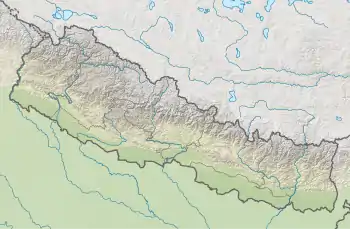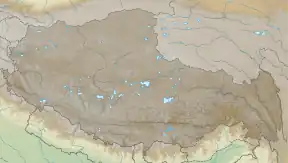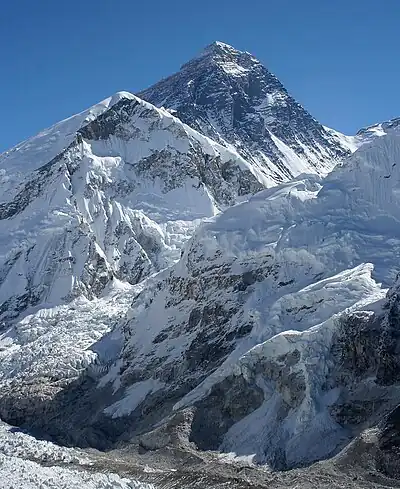| Nangpa La (Khumbu La) | |
|---|---|
 Traveling caravan crossing the Nangpa La. The Lunag Ri is in the background. | |
| Elevation | 5,716 m (18,753 ft) |
| Location | Nepal (Khumjung) – China (Tibet) |
| Range | Himalayas |
| Coordinates | 28°06′28″N 86°35′17″E / 28.10778°N 86.58806°E |
 Nangpa La (Khumbu La)  Nangpa La (Khumbu La) | |
| Nangpa La | |||
|---|---|---|---|
| Traditional Chinese | 囊帕拉山口 | ||
| Simplified Chinese | 囊帕拉山口 | ||
| |||
Nangpa La (Chinese: 囊帕拉山口 also known as Chinese: 朗喀巴山口) (el. 5,806 m or 19,050 ft) is a high mountain pass crossing the Himalayas and the Nepal-Tibet Autonomous Region border a few kilometres west of Cho Oyu and some 30 km (20 mi) northwest of Mount Everest.[1] A foot-trail over Nangpa La is the traditional trade and pilgrimage route connecting Tibetans and Sherpas of Khumbu. This was the location of the 2006 Nangpa La shootings.
Background
From this pass the Mahalangur section of the Himalaya extend east past Cho Oyu, Gyachung Kang, Everest, Ama Dablam and Makalu to the gorge of the Arun River. The Rolwaling Himalayas including Gauri Sankar and Melungtse rise west and southwest of the pass.
In 1951 Dane Klaus Becker-Larsen and two Sherpas attempted the North Col, but turned back because of rockfall. He had minimal equipment and no mountaineering experience. He may have been the first Westener to reach Nangpa La.[2]
The 1952 British Cho Oyu expedition led by Eric Shipton established a base at Lunak below the Nangpa La Pass. Shipton wanted to avoid any clashes with Chinese troops, but eventually agreed to a camp just short of the Nangpa La, and to send a party to attempt the first crossing of the Nup La pass which could be quickly withdrawn if Chinese troops were sighted. But Ed Hillary, George Lowe and three Sherpas crossed the Nup La col and then went "deep into Chinese territory" like "a couple of naughty schoolboys".[3]
In 2006, Chinese border guards of the People's Armed Police (PAP) opened fire on 75 unarmed Tibetan refugees as they traversed waist-deep snow in the Nangpa La shooting incident, killing 17-year-old Buddhist nun Kelsang Namtso and leading to the disappearance of a further 17 refugees. Despite an attempted Chinese coverup, several foreign climbers at base camps on Cho Oyu managed to video and photograph the situation as it unfolded and the events drew widespread international condemnation when shown to the outside world.[4][5][6]
See also
References
- ↑ Encyclopædia Britannica. "Nangpa-La (pass, Asia)". Retrieved 2009-06-30.
- ↑ "Time line". EverestHistory.com. Archived from the original on 2010-05-26. Retrieved 2010-05-25.
- ↑
- Lowe, George (2013). The Conquest of Everest: Original Photographs from the Legendary First Ascent. London: Thames & Hudson. pp. 65, 212. ISBN 978-0500544235.
- ↑ Jonathan Green. Murder in the High Himalaya. 2010. ISBN 978-1-58648-714-0
- ↑ China draws a veil across the mountains The Guardian 27 October 2006
- ↑ Death on Tibetans' long walk to freedom The Guardian 30 October 2006
